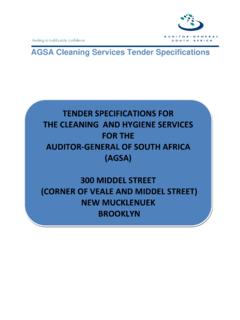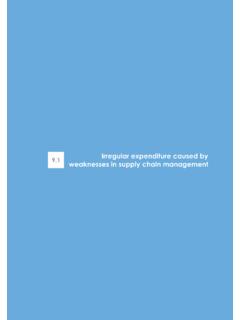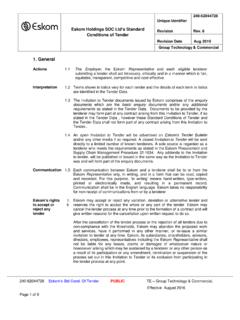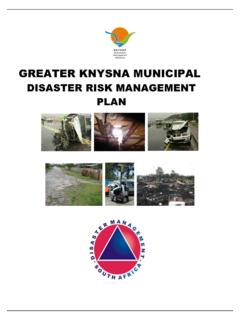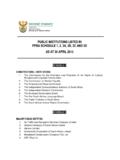Transcription of 4 Status of state-owned enterprises 41 - agsa.co.za
1 General report on the national and provincial audit outcomes for 2016-1741 Status of state-owned enterprises4 General report on the national and provincial audit outcomes for 2016-17424. Status of state-owned enterprisesThe public entities defined in the Public Finance Management Act (PFMA) include government business enterprises , more commonly known as state-owned enterprises or SOEs. In this section, we specifically focus on the Status of major public entities, as listed in schedule 2 of the PFMA. These SOEs are independent entities partially or fully owned by the state to achieve the various socio-economic goals of government they are expected to fulfil a dual commercial and developmental of these SOEs have a direct impact on the lives of citizens through the services and infrastructure they provide.
2 Poor governance, mismanagement, fraud and corruption claims and a lack of financial sustainability at some of the SOEs have been in the spotlight for the past few years attracting attention as taxpayers money is used to sustain the failing SOEs. As this narrative contributes to the loss of public confidence in the ability of the state to govern and oversee these SOEs, we have included our findings on the state of SOEs in this report based on our audits. We do not audit all the SOEs some are audited by private audit firms in accordance with the directives we provide using our methodology for auditing compliance and performance information. These audit firms are appointed by the boards of the SOEs.
3 We maintain a close relationship with the appointed audit firms, in particular with those auditing SOEs we categorised as significant-risk entities. It allows us to continuously increase our oversight and involvement in these audits in order to improve consistency in auditing and reporting on all SOEs and to provide guidance and support on technical and governance matters. We can opt to perform these audits and we have significantly increased the number of SOEs we audit over the past few 1 shows which audits we performed in 2016-17 and on which we report in this section. It also shows those audited by audit firms and which have been identified as significant-risk entities for increased oversight by the Auditor-General of South Africa (AGSA).
4 Their audit outcomes are not included in the analysis in this section but we include some observations in this regard. The subsidiaries that are classified as small auditees are not included in the table below or in our budgets administered by the 25 SOEs (including the subsidiaries) we audit totalled R31 billion in 2016-17 17% of the total public entity budget and 3% of the total 2016-17 budget of departments and public report on the national and provincial audit outcomes for 2016-1743 Table 1: Audit of state-owned enterprisesSOEs audited by the AGSASOEs audited by audit firms Independent Development Trust Acsa Sapo and its subsidiary Courier and Freight Group Land Bank and its subsidiaries Land Bank Life Insurance and Land Bank Insurance Armscor SABC Central Energy Fund and its subsidiaries PetroSA, PetroSA Ghana, SA Agency for Promotion of Petroleum Exploration and Exploitation (Petroleum Agency SA), and Strategic Fuel Fund Necsa and its subsidiaries Gammatec NDT Supplies, NTP Radioisotopes and Pelchem SA Express South African Forest Company (Safcol)
5 And its subsidiary Komatiland Forests SAA and its subsidiaries Air Chefs, Mango Airlines and SAA Technical Telkom SA and its subsidiaries Trans-Caledon Tunnel Authority Industrial Development Corporation of South Africa Alexkor Broadband Infraco Development Bank of Southern Africa Air Traffic and Navigation Service CompanySignificant-risk SOEs audited by audit firms Denel and its subsidiaries Transnet and its subsidiaries Eskom and its subsidiariesOverall audit outcomes We set the cut-off date for inclusion of the audit outcomes in this report as 31 August 2017. By this date, the following six audits had not been completed: SAA and subsidiaries (four SOEs) this is the first year that we have audited the SAA group.
6 Except for Mango Airlines, we have not yet received the final financial statements of the group. The four companies in the SAA group received clean audits in the previous year. SA Express again submitted their financial statements late (only by 31 August). This company received a qualified audit opinion last year with material findings on their performance reporting and compliance with legislation. The Independent Development Trust received a qualified audit opinion in 2013-14 and subsequently received disclaimed opinions in the 2014-15 and 2015-16 financial years after deficiencies were identified in management s processes to appropriately account for programme expenditure.
7 The delay in submitting information had an overall negative impact on the timely finalisation of the 2016-17 audit. The audit was subsequently completed but was too late to be included in the analysis in this report. The entity again received a disclaimed opinion as information was not available to support the occurrence of programme expenditure in the financial year it related to with material findings on performance reporting and compliance with SCM legislation. However, the entity had made progress in some areas since the previous report on the national and provincial audit outcomes for 2016-1744 Figure 1 reflects the audit outcomes of the 19 completed audits over four 1: Audit outcomes over four yearsUnqualified with no findingsUnqualified with findingsQualified with findingsAdverse with findingsDisclaimed with findingsThe audit outcomes regressed over the four-year period and from the previous year the outcomes are likely to be even worse once the outstanding audit results are included.
8 The SOEs with clean audit outcomes were Armscor (for the past three years), Land Bank Life Insurance (for the past three years) and three SOE subsidiaries that had improved to a clean audit Status (Gammatec NDT Supplies, NTP Radioisotopes and PetroSA Ghana). Petroleum Agency SA and Land Bank Insurance lost their clean audit Status of the previous year as a result of material non-compliance with legislation. The audit outcomes of the SOEs audited by private audit firms (which are not included in the graphic above) also regressed from the previous year. The following three regressed: Broadband Infraco lost its clean audit Status as a result of material findings on compliance and their performance report, while Air Traffic Navigate Services did so as a result of various material misstatements in their financial statements and material findings on compliance with legislation.
9 Eskom was qualified as all irregular expenditure incurred was not disclosed and due to material findings on compliance with SCM audit opinion of Transnet remained unchanged as unqualified with findings on performance reporting and audit opinion of Denel had not yet been finalised at the date of this 2 shows the audit opinions on the financial statements and the findings on the performance reports over two years as well as the percentage of SOEs that submitted financial statements and performance reports without material misstatements (orange line). It also shows the number of SOEs that had material findings on compliance with key legislation in the past two report on the national and provincial audit outcomes for 2016-1745 Figure 2: Audit outcomes on three key areasAs shown in figure 2, the SOEs regressed in all areas except for compliance with legislation in which there was a slight improvement.
10 The regression in the quality of the financial statements was as a result of the following: The SABC regressed from a qualified opinion to an adverse opinion and the Courier and Freight Group (a subsidiary of Sapo) retained its previous year s adverse opinion both had various material misstatements in their financial statements and could not substantiate that they are going concerns (going concern is discussed later on in this section). Sapo remained qualified in areas such as property, plant and equipment as well as irregular expenditure. Safcol and its subsidiary Komatiland Forests regressed to a qualified opinion, as they did not disclose all the irregular expenditure 14 SOEs had unqualified audit opinions, only eight submitted financial statements without material misstatements.
